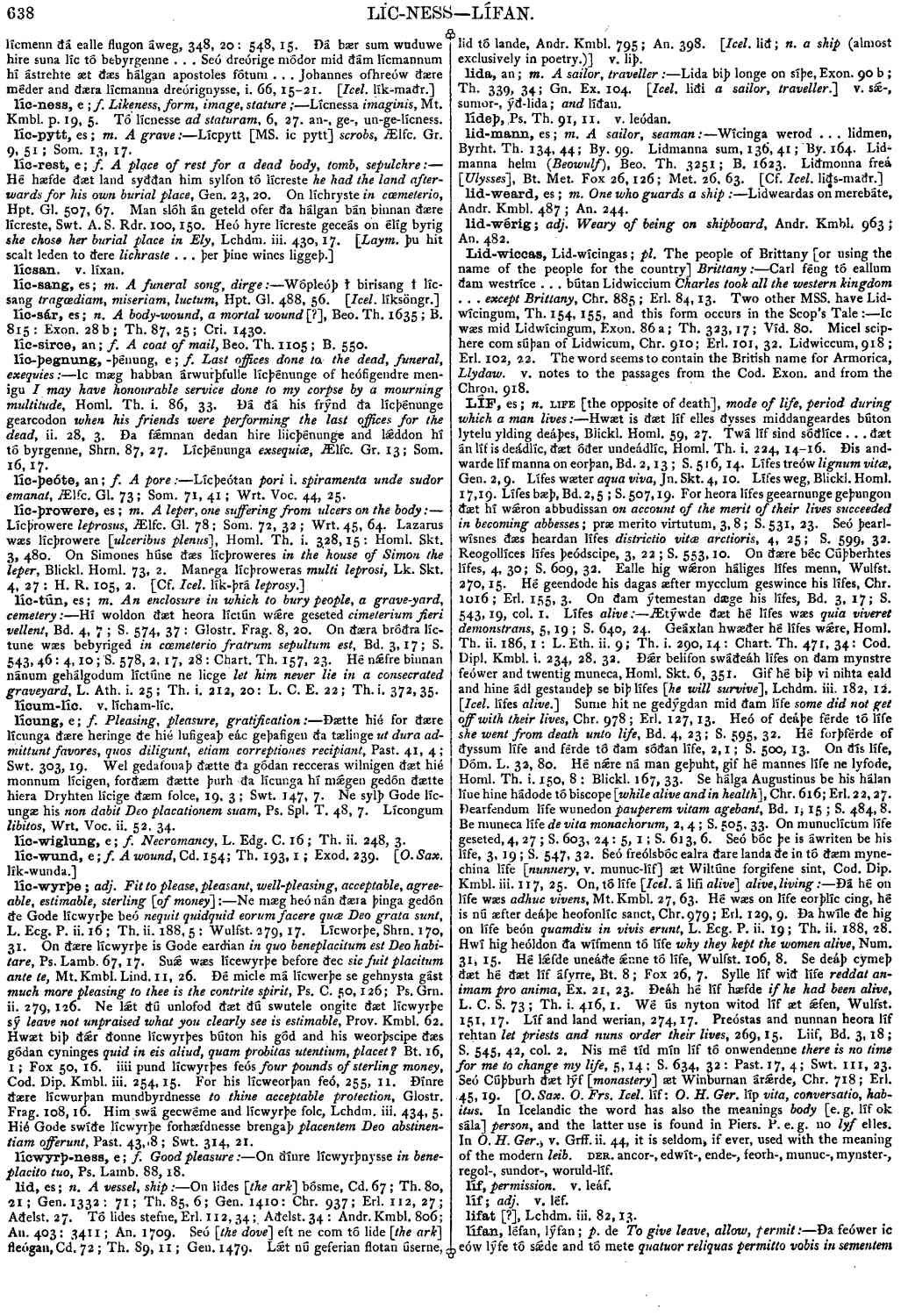LÍF
- noun [ neuter ]
-
Hwæt is ðæt líf elles ðysses middangeardes búton lytelu ylding deáþes,
- Blickl. Homl. 59, 27 .
-
Twá líf sind sóðlíce ... ðæt in líf is deádlíc, ðæt óðer undeádlíc,
- Homl. Th. i. 224, 14-16 .
-
Ðis andwarde líf manna on eorþan,
- Bd. 2, 13 ;
- S. 516, 14 .
-
Lífes treów
lignum vitæ,
- Gen. 2, 9 .
-
Lífes wæter
aqua viva,
- Jn. Skt. 4, 10 .
-
Lífes weg,
- Blickl. Homl. 17, 19 .
-
Lífes bæþ,
- Bd. 2, 5 ;
- S. 507, 18 .
-
For heora lífes geearnunge geþungon ðæt hí wǽron abbudissan
on account of the merit of their lives succeeded in becoming abbesses;
præ merito virtutum,
- 3, 8 ;
- S. 531, 23 .
-
Seó þearlwísnes ðæs heardan lífes
districtio vitæ arctioris,
- 4, 25 ;
- S. 599, 32 .
-
Reogollíces lífes þeódscipe,
- 3, 22 ;
- S. 553, 10 .
-
On ðære béc Cúþberhtes lífes,
- 4, 30 ;
- S. 609, 32 .
-
Ealle hig wǽron háliges lífes menn,
- Wulfst. 270, 15 .
-
Hé geendode his dagas æfter mycclum geswince his lífes,
- Chr. 1016 ;
- Erl. 155, 3 .
-
On ðam ýtemestan dæge his lífes,
- Bd. 3, 17 ;
- S. 543, 19, col. 1 .
-
Lífes
alive:--
Ætýwde ðæt hé lífes wæs
quia viveret demonstrans,
- 5, 19 ;
- S. 640, 24 .
-
Geáxtan hwæðer hé lífes wǽre,
- Homl. Th. ii. 186, 1 :
- L. Eth. ii. 9 ;
- Th. i. 290, 14 :
- Chart. Th. 471, 34 :
- Cod. Dipl. Kmbl. i. 234, 28. 32 .
-
Ðǽr belifon swáðeáh lífes on ðam mynstre feówer and twentig muneca,
- Homl. Skt. 6, 351 .
-
Gif hé biþ vi nihta eald and hine ádl gestaudeþ se biþ lífes
[he will survive],
- Lchdm. iii. 182, 12 .
[ Icel. lífes alive.]Sume hit ne gedýgdan mid ðam lífe
some did not get off with their lives,
- Chr. 978 ;
- Erl. 127, 13 .
-
Heó of deáþe férde tó lífe
she went from death unto life,
- Bd. 4, 23 ;
- S. 595, 32 .
-
Hé forþférde of ðyssum lífe and férde tó ðam sóðan lífe,
- 2, 1 ;
- S. 500, 13 .
-
On ðís lífe,
- Dóm. L. 32, 80 .
-
Hé nǽre ná man geþuht, gif hé mannes lífe ne lyfode,
- Homl. Th. i. 150, 8 :
- Blickl. 167, 33 .
-
Se hálga Augustinus be his hálan líue hine hádode tó biscope
[while alive and in health],
- Chr. 616 ;
- Erl. 22, 27 .
-
Ðearfendum lífe wunedon
pauperem vitam agebant,
- Bd. 1, 15 ;
- S. 484, 8 .
-
Be muneca lífe
de vita monachorum,
- 2, 4 ;
- S. 505, 33 .
-
On munuclícum lífe geseted,
- 4, 27 ;
- S. 603, 24 :
- 5, 1 ;
- S. 613, 6 .
-
Seó bóc þe is áwriten be his lífe,
- 3, 19 ;
- S. 547, 32 .
-
Seó freólsbóc ealra ðare landa ðe in tó ðæm mynechina lífe
[nunnery, v. munuc-líf]
æt Wiltúne forgifene sint,
- Cod. Dip. Kmbl. iii. 117, 25.
-
On, tó lífe
[Icel. á lifr alive] alive, living:--
Ðá hé on lífe wæs
adhuc vivens,
- Mt. Kmbl. 27, 63 .
-
Hé wæs on lífe eorþlíc cing, hé is nú æfter deáþe heofonlíc sanct,
- Chr. 979 ;
- Erl. 129, 9 .
-
Ða hwíle ðe hig on lífe beón
quamdiu in vivis erunt,
- L. Ecg. P. ii. 19 ;
- Th. ii. 188, 28 .
-
Hwí hig heóldon ða wífmenn tó lífe
why they kept the women alive,
- Num. 31; 15 .
-
Hé lǽfde uneáðe ǽnne tó lífe,
- Wulfst. 106, 8 .
-
Se deáþ cýmeþ ðæt hé ðæt líf áfyrre,
- Bt. 8 ;
- Fox 26, 7 .
-
Sylle líf wið lífe
reddat animam pro anima,
- Ex. 21, 23 .
-
Ðeáh hé líf hæfde
if he had been alive,
- L. C. S. 73 ;
- Th. i. 416, 1 .
-
Wé ús nyton witod líf æt ǽfen,
- Wulfst. 151, 17.
-
Líf and land werian,
- 274, 17 .
-
Preóstas and nunnan heora líf rehtan
let priests and nuns order their lives,
- 269, 15 .
-
Liif,
- Bd. 3, 18 ;
- S. 545. 42, col. 2 .
-
Nis mé tíd mín líf tó onwendenne
there is no time for me to change my life,
- 5, 14 ;
- S. 634, 32 :
- Past. 17, 4 ;
- Swt. 111, 23 .
-
Seó Cúþburh ðæt lýf [monastery] æt Winburnan árǽrde,
- Chr. 718 ;
- Erl. 45, 19 .
Bosworth, Joseph. “LÍF.” In An Anglo-Saxon Dictionary Online, edited by Thomas Northcote Toller, Christ Sean, and Ondřej Tichy. Prague: Faculty of Arts, Charles University, 2014. https://bosworthtoller.com/21603.
Checked: 1